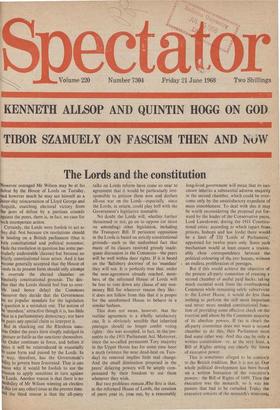owever outraged Mr Wilson may be at his efeat by
the House of Lords on Tuesday, nd however much he may see himself as a tier-day reincarnation of Lloyd George and squith, snatching electoral victory from he jaws of defeat by a partisan crusade gainst the peers, there is, in fact, no case for uch intemperate action.
Certainly, the Lords were foolish to act as hey did. Not because ux resolutions should binding on a British parliament (that is oth constitutional and political nonsense; bile the resolution in question has some par- lentarty undesirable 'clauses) but because no Wetly constitutional issue arises. And it has ecome generally accepted that the House of rds in its present form should only attempt overrule the elected chamber on nuinely constitutional grounds. The doe- that the Lords should feel free to over- * (and hence delay) the Commons henever they decide that the Government as no popular mandate for the legislation question is a mistaken one. The notion of `mandate,' attractive though it is, has little ace in a parliamentary democracy; nor have e peers any special claim to interpret it. But in chucking out the Rhodesia sane- ens Order the peers have simply indulged in gesture as futile as the sanctions themselves. he Order continues in force, and before it Pses it will be reintroduced in essentially e same form and passed by the Lords. In 0 way, therefore, has the Government's ility to govern been frustrated. That is one son why it would be foolish to use the asion to apply sanctions in turn against ords. Another reason is that there is no bility of Mr Wilson winning an election is (or any other) issue at the present time. the third reason is that the all-party talks on Lords reform have come so near to agreement that it would be particularly irre- sponsible to jettison them now and declare all-out war on the Lords—especially since the Lords, in return, could play hell with the Government's legislative timetable.
No doubt the Lords will, whether further threatened or not, go on to oppose (or insist on amending) other legislation, including the Transport Bill. If persistent opposition in the Lords is based on strictly constitutional grounds—such as the undoubted fact that many of its clauses received grossly inade- quate discussion in the Commons—the peers will be well within their rights. If it is based on the 'Salisbury doctrine' of no 'mandate' they will not. It is perfectly true that, under the near-agreement already reached, mem- bers of the reformed House of Lords will be free to vote down any clause of any non- money Bill for whatever reason they like: it does not follow from this that it is proper for the unreformed House to behave in a similar fashion.
This does not mean, however, that the outline agreement is a wholly satisfactory one. It is obviously sensible that inherited peerages should no longer confer voting rights : this was accepted, in fact, in the pre- amble to the 1911 Parliament Act. Moreover, since the so-called permanent Tory majority in the Upper House has for some time been a myth (witness the near dead-heat on Tues- day) its removal implies little real change. And the small diminution proposed in the peers' delaying powers will be amply com- pensated by their freedom to use them whenever they wish. long-lived government will mean that its suc- cessor inherits a substantial adverse majority in the second chamber, which could be over- come only by the unsatisfactory expedient of mass ennoblement. To deal with this it may be worth reconsidering the proposal put for- ward by the leader of the Conservative peers, Lord Lansdowne, during the 1911 Constitu- tional crisis; according to which (apart from, princes, bishops and law lords) there would; be a limit of 320 `Lords of Parliament,' appointed for twelve years only. Some such mechanism would at least ensure a reaS'on, ably close correspondence between the. political colouring of the two houses, without an endless proliferation of peerages.
But if this would achieve the objective of, the present all-party committee of creating a second chamber of useful paid hacks, taking much essential work Iron) the overburdened Commons while remaining safely subservient to the Lower House, it would do less than nothing to perform the still more important and never more needed constitutional func- tion of providing some effective check on the exercise and abuse by the Commons majority of its absolute powers. If (as is clear) the all-party committee does not want a second . chamber to. do this, then Parliament must. find some other way. And this can be only a written constitution--or, at the very least, .a Bill of Rights setting out clearly the limits of executive power.
This is sometimes alleged to he contrary to the British tradition, But it is not so. Our whole political development has been based on a written limitation of the executive's powers : the Bill of Rights of 1689. Then the executive was the monarch, so it was his powers that had to be curtailed. Today the executive consists of the monarch's ministers; yet they are (effectively) subject to no circum- scription whatever. We put a fence round the dangerous bull, but the bull has moved into another field which we insist on keeping un- fenced. We pride ourselves on believing in constitutional, rather than absolute, mon- archy; yet we have allowed a situation to grow up in which there is a new absolute monarch (no less absolute for being elective) subject to no constitutional constraints what- ever. When the relatively trivial issue of House of Lords reform has been settled along the lines of the all-party agreement, then will be the time to remedy this country's most serious constitutional defect of all: the lack of a constitution.







































 Previous page
Previous page